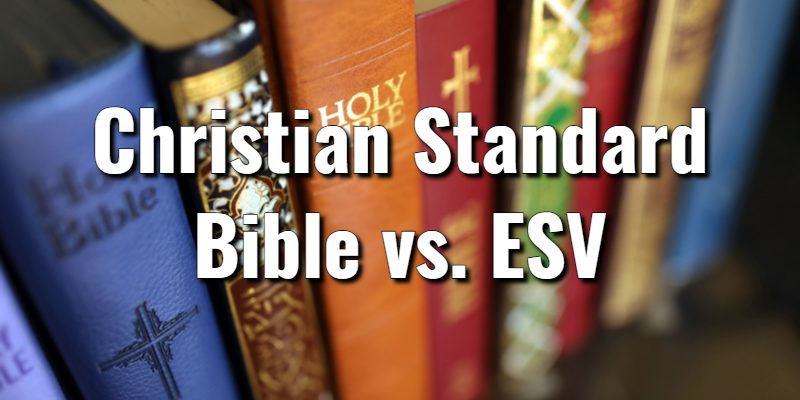This is part of Lord’s Library’s Bible Comparison Series. Our editors explore the Christian Standard Bible vs. ESV (English Standard Version) so you can understand the major differences between each translation.
 When looking for a new Bible for yourself or as a gift, comparing the different Bible versions is an ideal first step. It’s also important that one considers the various Christian Church denominations when Bible shopping so the reader can be comfortable with their translation’s version of English. Some churches mandate a precise edition as well, while others may be curious about which version of the manuscript their favorite Bible translation comes from.
When looking for a new Bible for yourself or as a gift, comparing the different Bible versions is an ideal first step. It’s also important that one considers the various Christian Church denominations when Bible shopping so the reader can be comfortable with their translation’s version of English. Some churches mandate a precise edition as well, while others may be curious about which version of the manuscript their favorite Bible translation comes from.
.If you’ve ever asked the question “What’s the difference between the Christian Standard Bible vs. ESV?” you’ve come to the right place. It’s in that spirit that our editors compiled this short resource by first offering a simple description of each Bible version, and then a comparison that highlights key contrasts. For each of the two Bible versions compared, Lord’s Library editors included links to our directories of the best editions, as well as the most popular products.
Christian Standard Bible vs. ESV (English Standard Version)
What is the Christian Standard Bible (CSB)?
The Christian Standard Bible was created with the goal of drawing readers into a deeper, more meaningful relationship with God. It started as a revision of the 2009 edition of the Holman Christian Standard Bible (HCSB). It strived to do so by presenting a Bible with the clearest possible modern English. This translation was worked on by 100 scholars from 17 different
denominations. They worked with the intent to capture the Bible’s original meeting without compromising readability. The translation was completed in June of 2016. The first full edition was published in March of 2017. There was an update to the Christian Standard Bible released in February of 2020.
What is the ESV (English Standard Version)?
Of the more modern, meaning-for-meaning translated Bibles, the English Standard Version most closely walks the line between literal, word-for-word translating and attempting to convey the meaning above all else. The first complete ESV Bible was published in 2001 by Crossway, as a revision of the Revised Standard Version. The team of over 100 evangelical scholars and pastors had a unique philosophy in translating this Bible: “Emphasizes word-for-word accuracy, literary excellence, and depth of meaning.”
The ESV remains a popular choice among evangelical churches. That’s because of its unique ability to walk that line between honoring the literal translations that preceded it (such as the RSV) while conveying meaning and modern language in an accessible way. This view is not shared by all though, as some believe that while pursuing this goal the translators have made a few grave errors in theology.
Christian Standard Bible vs. ESV; What’s the Difference?
The Christian Standard Bible and the English Standard Version are both lauded and highly readable modern Bible translations. The Christian Standard Bible leans toward simpler readability while the ESV is the more literal translation. Both are trusted for different reasons, but the ESV has broken out as one of the most adopted English Bible editions today.
The Christian Standard Bible strives to blend the word-for-word and thought-for-thought translation styles while the English Standard Version clings to the tradition of formal equivalence. The CSB blurs those lines just enough to improve readability but does not stretch it nearly as far as translations like the NLT do.
The ESV used Biblica Hebraica Stuttgartensia as its basis for the Old Testament and the UBS Greek for its New Testament. The Christian Standard Bible used Biblica Hebraica Stuttgartensia as its basis for the Old Testament and Novum Testamentum Graece as its basis for the New Testament.
Lord's Library participates in affiliate programs. We may make a small commission from products purchased through this resource.
- What Does the Bible Say About Discernment? With Key Scriptures - July 19, 2024
- What Does the Bible Say About Disobedience? With Key Scriptures - July 19, 2024
- 1 Timothy 1:12 Meaning: Commentary on an Important Scripture - July 11, 2024














